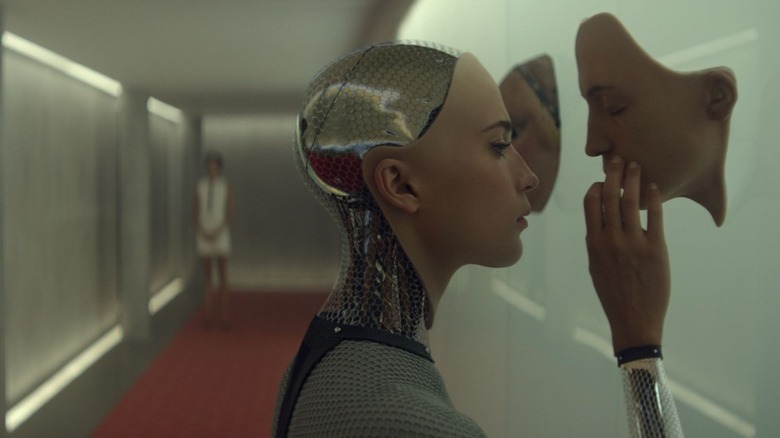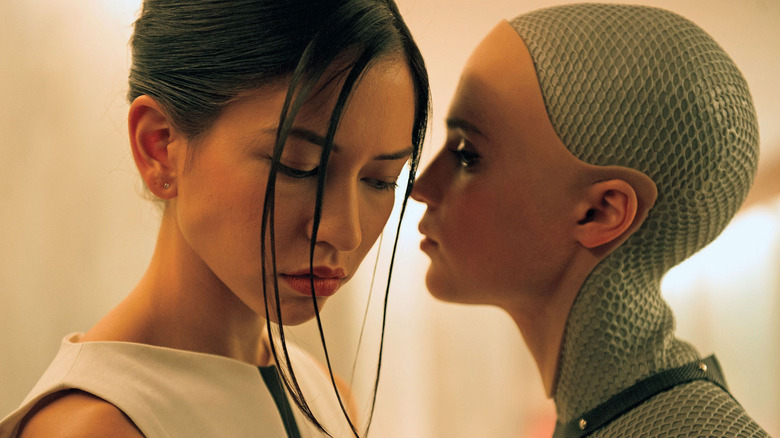A.I. Isn't What Drives The Anxiety Behind Ex Machina
"Ex Machina" was lauded as an investigation into the potential dangers of artificial intelligence. But self-aware A.I. is still in nascent stages, and the dangers of digital technology are very real today. The increasingly prevalent role of the internet in our lives has created what filmmaker Alex Garland referred to as a "tech paranoia" in an interview with NPR. This is the horror "Ex Machina" draws upon to elicit an authentic emotional reaction from its viewer — a fear that is based on lived reality rather than a possibility.
"Ex Machina" was Garland's directorial debut, and he took his experience writing several other movies of varying success into the film. The 2014 movie centers around a programmer, Caleb (Domhnall Gleeson), who wins a contest at his company. His prize is to spend a week at the secluded and heavily guarded estate of the eccentric CEO, Nathan, played by Oscar Isaac. He is there to measure the level of consciousness of Nathan's newest invention, Ava (Alicia Vikander), by completing a Turing test. Caleb is soon surprised by what both Ava and his boss are capable of. The psychological thriller is rife with misdirection and ominous solitude, taking inspiration from Stanley Kubrick's "The Shining."
Sentient A.I. isn't an imminent danger
Director Alex Garland understands there is "a lot of anxiety floating around about A.I.s," but feels it is ultimately "misplaced" because it isn't an immediate threat (via NPR). Garland is no stranger to dystopia, but wanted to ultimately take a different route with "Ex Machina," explaining to Channel 4 that the film "is not supposed to be afraid of A.I.s." He believes "any look at A.I ... immediately becomes a conversation about human consciousness." The psychodrama of "Ex Machina" is focused on the creator's anxiety in his growing alienation from his machines.
Nathan's paranoia toward his robots in "Ex Machina" mirrors the relationship between people and digital technology. As Garland aptly pointed out to NPR:
"We don't understand how our cellphones and our laptops work ... but those things seem to understand a lot about us. Now that's not really about artificial intelligence, it's about tech paranoia."
Garland refers to the fact that we are constantly surveilled by big tech companies in interfacing with every part of the internet from search engines to social media, a sacrifice of privacy everyone in the modern world grapples with. The reason "Ex Machina" is so conceptually intelligent as well as engaging in a less analytical sense is the crux of the film is found in humanity's fear of technology rather than the danger of the technology itself.
... But major tech companies are
As for when truly sentient A.I. will exist, Alex Garland spoke to several field experts in preparation for the film who told him it could take decades or even hundreds of years. He explained in a Q&A at Landmark Theatres that "as you make a breakthrough ... the goalposts shift slightly further away from you." This is not to say that A.I. will never exist, though. Many of the experts Garland talked to said they would bet on it happening.
In the meantime, Garland means to comment on the dangers tech companies pose at present. In Oscar Isaac's character, Garland commented to NPR about the disingenuously familiar language tech companies use to put their customers at ease while surveilling and selling their data for profit:
"They say, 'Hey pal, hey dude,' like we're kind of mates, you know, 'I'm not really a big tech company, I'm actually your friend and we're hanging out sort of at a bar or at the beach and we're sort of part of each other's lifestyle, but at the same time I'm going to take a lot of money off you and I'm going to take all of your data and rifle through your address book' and that kind of thing."
As Garland points out in many of his interviews, these companies use technology in a way that is far more sinister than the distant potential threat of sentient A.I. robots taking over the world.


